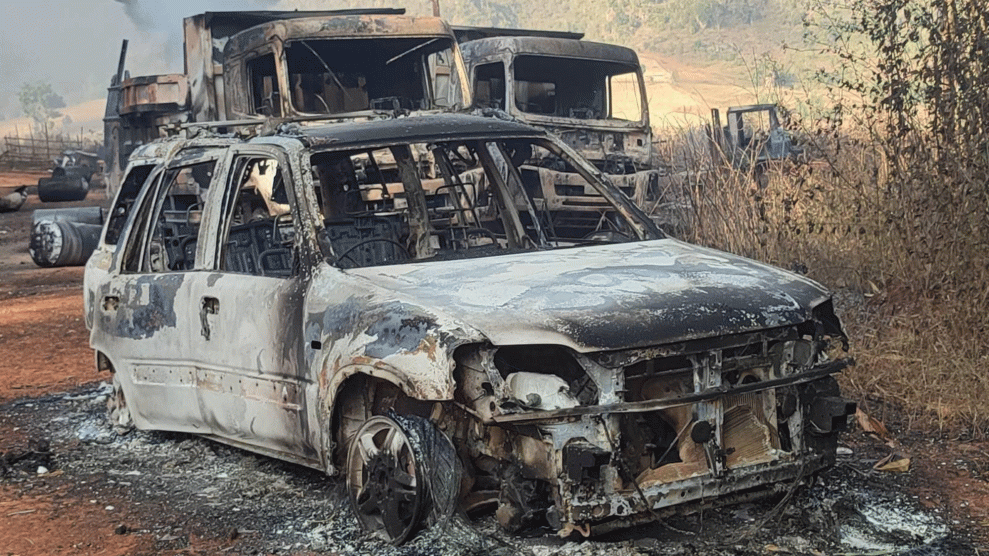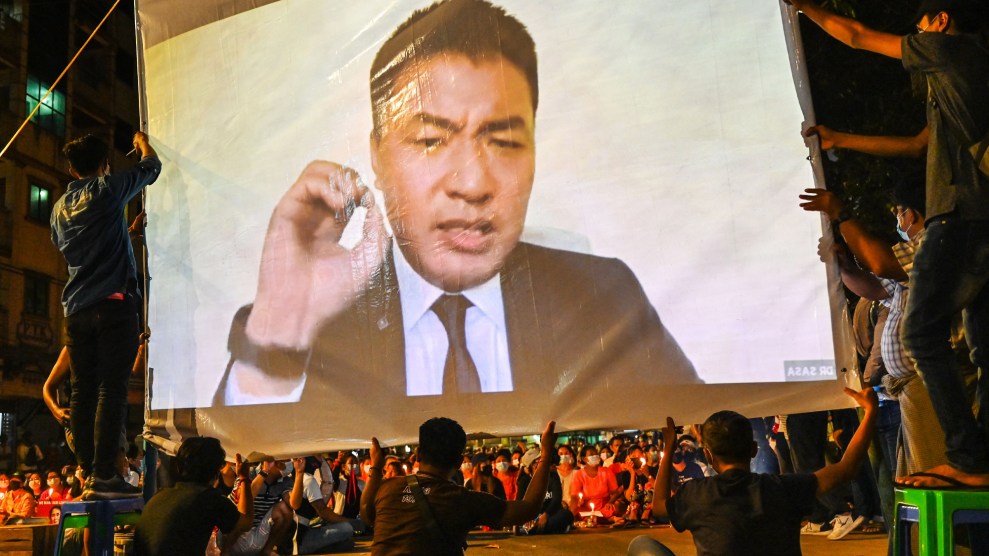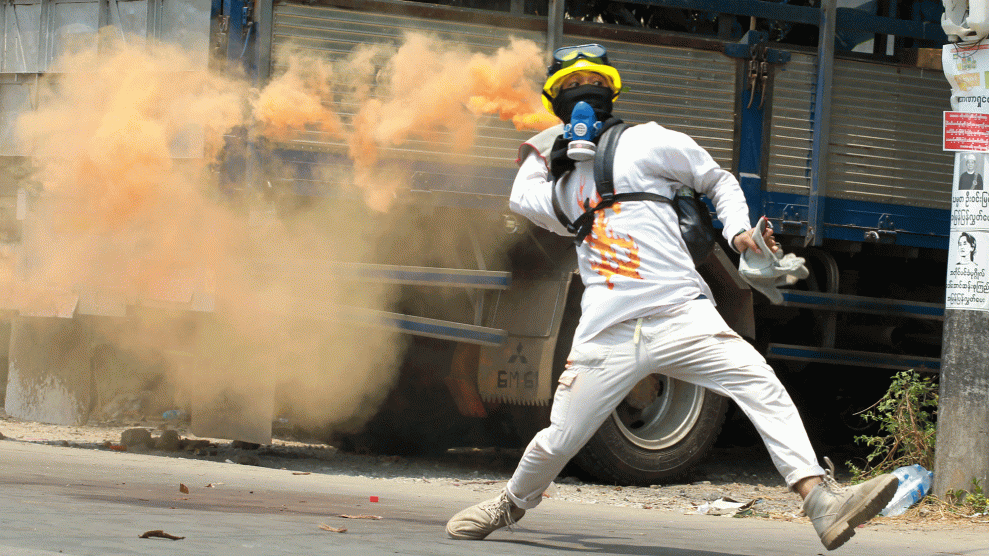
The aftermath of the Christmas Eve massacre committed near Hpruso TownshipKarenni National Defense Force/Karenni State Police/Karenni National Progressive Party
On Christmas Day, the charred remains of about 35 people, maybe more—men, women, and children—were discovered in several burned-out vehicles in Kayah, a state in eastern Myanmar. The National Unity Government, comprised of the democratically elected officials who were forced out of power by a military coup a year ago, said that junta troops the day before had “detained an unconfirmed number” of villagers and travelers and then massacred them. According to the Karenni National Defense Force, a civilian militia fighting the Myanmar military, the dead were locals searching for refuge from the conflict. Save the Children announced that two members of its staff were killed in the attack. In a statement, the charity reported, “The men were on their way back to their office after working on a humanitarian response in a nearby community when they were caught up in the attack. The military forced people from their cars, arrested some, killed many and burnt the bodies.”
One of the Save the Children staffers was 32 years old, the father of a 10-month-old son, who had worked for the charity for two years, training teachers. The other, a 28-year-old man with a 3-month-old daughter, had been with the group for six years. Local Karenni officials—the Karenni people are the main population group in this area—tell Mother Jones that some of the massacre victims had been tied up before being shot and burned.
Since overthrowing the government led by the party of Aung San Suu Kyi and seizing power on February 1, 2021, the military junta has killed an estimated 1,300 people—including protesters and opposition activists—and arrested more than 11,000. UN agencies and human rights groups have documented the military’s use of torture, murder, mass arrests, forced displacement, and other acts of violence. The Christmas Eve massacre, committed near Hpruso Township in a remote area of the country, was but one of many brutalities. But it was particularly appalling and sparked outrage throughout the country. Local doctors who tried to conduct autopsies on the remains—in many cases, piles of ash—initially concluded that five of the victims were women and three were children. They had a difficult time working on the fragile remains. One of their aims was to preserve genetic material that could be submitted for DNA testing—a capacity that does not exist locally—in order to identify the victims. The death count was uncertain; 42 people in the area were reported missing.
In the aftermath of the attack, Karenni authorities, who believe they have identified the military unit that committed the massacre, have been attempting to obtain global attention for this horrific act and pressing for an international investigation. As part of that effort, they provided Mother Jones with videos shot shortly after the massacre. The images are gruesome and upsetting. But Karenni officials want the world to see what occurred and hope that will spur action. Warning: the following videos show images of burned skeletal remains:
In response to a query from Mother Jones about the Christmas Eve massacre, the Independent Investigative Mechanism for Myanmar, an office within the United Nations Human Rights Council mandated to gather evidence of international crimes and violations of international law in that country, issued a statement: “The Mechanism is collecting information and evidence in relation to the incident you refer to. However, we are unable to comment in detail on the status of that investigation to ensure the confidentiality and integrity of the investigation. As warranted, any evidence of serious international crimes as may be developed through the Mechanism’s work will be shared with national, regional or international authorities that may have jurisdiction over those events.”
Karenni officials say they appreciate the UN agency’s interest, but they express frustration that the UN investigators have not yet been onsite.
“We are currently in need of support to analyse DNA samples of the victims,” says Nei Neh Plo, an official of Karenni National Progressive Party. “Since the UN and international community have mechanisms like IIMM, it should be collecting forensic data, witness testimony, interviews with families, among others at the crime scene because war crimes and crimes against humanity are being committed by the junta. If the UN is willing to come to the mass killing site in Karenni state…to conduct a necessary but thorough investigation, our doors are open. As of now, the Burmese junta is emboldened to commit more mass killings because they know there are still possibilities they can get away.”
The IIMM, with a staff of about 60, works under constraints. In accordance with UN rules, it cannot operate within a country without the permission of the host government. As of now, the military regime is regarded by the UN as Myanmar’s governing body. According to IIMM representatives, the IIMM has sent 10 requests for information to the Myanmar authorities since the beginning of 2020. None of these requests, including those sent since the junta seized power, has received any response—including a request for information concerning the Hpruso incident. If the junta refuses to communicate with the IIMM, the group cannot dispatch investigators into Myanmar to conduct interviews, examine the site, and facilitate the DNA analysis. IIMM staff, though, can investigate from a distance by assembling public information and collecting accounts remotely.
The IIMM was established in September 2018, more than two years before the military overthrew a democratically elected government, in response to allegations of human rights violations committed against minority groups in Myanmar, particularly the Rohingya, a Muslim ethnic group. The military coup itself was not a target of investigation for the IIMM. But as Nick Koumjian, a former Los Angeles district attorney who heads the IIMM, recently noted in a statement marking the anniversary of the coup, actions committed by the junta that might constitute war crimes, genocide, or crimes against humanity do fall within his organization’s scope: “Tragically, reports received over the last year suggest that well over a thousand individuals have been killed in circumstances that may qualify as crimes against humanity or war crimes. The security forces have detained thousands of civilians in circumstances that include credible allegations of arbitrary detention, torture, sexual violence and even killings while in detention.” He added, “The Mechanism is working diligently to substantiate and document the facts underlying these reports to establish whether these crimes were committed and if so, who is criminally responsible, and to prepare files that could facilitate prosecutions. The Mechanism has been able to gather a great deal of relevant material concerning these events and we are adding information and evidence to our files almost daily.”
The IIMM does not prosecute cases. It prepares case files that can be shared with national, regional, or international authorities that might initiate a prosecution. As of now, it is unclear what entity could do that regarding the Christmas Eve massacre.
In November, Koumjian, who has been a prosecutor of war crimes committed in Cambodia, East Timor, and Bosnia, said that the IIMM had amassed evidence showing that the military has engaged in an extensive and systematic attack on civilians “amounting to crimes against humanity.” He reported that his agency had collected more than 200,000 communications since the coup and over 1.5 million items of evidence.
Koumjian’s recent statement did not directly address the Christmas Eve massacre. But his comments applied to this case. “Investigations of serious international crimes are always challenging,” he said. “It typically takes a long time and significant resources to build good cases. The Mechanism is using all possible strategies and innovations to gather and verify evidence in order to build strong case files that can facilitate prosecutions in national and international courts.” He also issued a warning shaped by a sense of optimism: “Those who are considering committing crimes should be aware that serious international crimes have no statute of limitations. International justice has a very long memory and one day the perpetrators of the most serious international crimes in Myanmar will be held to account.”
Meanwhile, the fighting between the military and Karenni forces has continued. On January 8, Karenni officials released a statement accusing the junta of having launched indiscriminate air strikes that killed several civilians, forced thousands to flee their homes, and created a refugee crisis on the Myanmar–Thai border. They called on international governments and organizations “to take immediate action against the junta.”
Yet the military regime stays in place and the potential for war crimes and massacres remains, with the ongoing violence exacerbating the refugee crisis in Kayah and elsewhere. “Now that the world has seen how cruel the Myanmar junta is by committing many mass killings in our country,” says Saw Zin, an officer of the Karenni State Police who has been involved in the investigation of the Christmas Eve massacre, “we beg you to help us, as many of us—a majority, women and children—are becoming internally displaced in our own country. It is a matter of urgency.”
















